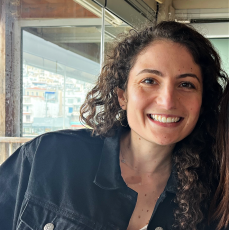In this first three weeks of being in Kenya, I have lived in four different places. These include Kirinyaga, Nanyuki, Ongata Rongai (outside of Nairobi), and Kileleshwa (in Nairobi). My fellowship is about studying pastoralists, and I feel like I am fitting the part.
Currently, I am on the way to my fifth destination—Tangulbei location, Chepkalacha village, Baringo County—where we will hold our first children’s peace camp of the summer! For the next four days, we’ll convene students, teachers, reverends, chiefs, and “peace ambassadors” from the IlChamus and Pokot tribes at a local Pokot school. We’ll facilitate a series of kid-friendly teambuilding activities for the students where, maybe for the first time, they will engage with children from the other respective tribe. En route to Chepkalacha, Monica and I sat in the front seat of CPI’s land cruiser and she gave me insights into the local culture. In fact, since arriving I have learned the most in bits—usually in conversations with Monica or Purity. In other internships, I would expect to learn from a formal orientation; at CPI, I learn through observation and chatting.
Comparing the Pokot and IlChamus in broad strokes, the Pokot are the aggressors in terms of instigating violence or cattle raids, while the IlChamus are the victims. Monica explained, “the Ilchamus know what the gunshots sound like and who they are coming from (the Pokot).” This is partly because Chepkalacha (where the Pokot live) has less abundant resources than the IlChamus in Kiserian, close to Lake Baringo. Interestingly, the Pokots reside in the “bush,” off the main road and far from the main drag, making it challenging for potential aggressors to find them.
We drove by a group of young girls whose heads were shaven. To my surprise, this means that they are students. Girls who go to school shave their heads, and girls who are not in school (either their family can’t afford it, or they have other responsibilities) keep their hair. This is because if you are a female student, you should be focused on your studies, not your appearance. Then, we passed by a young girl who had her hair and was followed by a group of goats. She couldn’t have been more than 10 years old. Evidently, instead of being in school, she was chosen by her family to herd cattle. As I learned, parents decide which of their children to herd their cattle based on how responsible they are. You would think that children deemed most responsible would be sent off to school to learn and flourish academically. Instead, their diligence is utilized to keep the family’s cattle healthy and plentiful. This is an example of how cattle come above all else.
My first activity after putting my bags down in my room at the Catholic mission was going into town to help Mama Chadi buy shoes for peace camp. The main drag had about ten small shops. We walked by one of the few shops selling refrigerated sodas and water. I opened the fridge to find the last plastic bottle of water. It was half empty.
Walking back to the Mission, I asked Mama Chadi if she would call this community “poor.” She said no; they simply have a different interpretation of wealth. In urban cities, wealth is shown by tall buildings, nice cars, and fancy storefronts. Here, wealth is based on how many goats you have. A man could live in a tiny tin-roof shack or hut and never have heard of Nairobi; but if he has more goats than the other men, then he is rich.
Posted By Olivia Landau
Posted Jun 18th, 2024




4 Comments
Monica Kinyua
June 18, 2024
Olivia this is a great read. Am glad you wrote this ahead of experiencing the actual activities. I admire learning through your blog the new things you are observing and the new learnings that are happening from the different cultures you are exposed to. Good job Olivia.
Mary Ellen Cain
June 24, 2024
Olivia, you have such interesting observations regarding the customs and priorities of the pastoral tribes! How can having their most capable girls take care of their animals be more important than educating them? Are the boys treated the same way? And the different concepts of wealth between the pastoralists and the city folk are also eye-opening, but actually understandable considering how each group makes a living. I look forward to learning more about these fascinating people and their cultures!
Iain Guest
June 24, 2024
Olivia – I totally agree with Monica. Just a great blog, with so many insights and colorful touches! Who would have thought that a shaven head mean a girl attends school? Also, that the more aggressive Pokot live far from the roads, where they’re harder to track down? Stay curious – please! – and you will have built up a rich portrait of pastoral life by the time you leave. Well done!
Bobbi Fitzsimmons
June 24, 2024
In working with young children, I’ve often used “The Cooperative Games and Sports” book by Terry Orlick. After reading your blog, I think this is something The Advocacy Project needs to add to its resources. Given choices of competitive or cooperative games, young children (who haven’t had as much competitive experience) always gravitated to the cooperative games. And that’s just what you’re building in Kenya. I can’t wait to read your blogs about the camps.